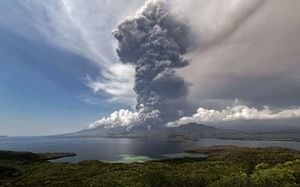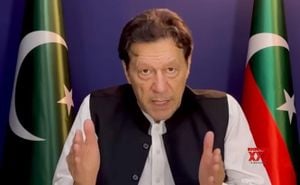Keir Starmer's recent decision to cancel his family summer holiday has sparked considerable debate and criticism. The UK Prime Minister's choice, primarily motivated by the recent civil unrest and riots across the country, raises questions around the expectations placed on political leaders during crises.
Historically, summer holidays for British Prime Ministers have become somewhat of a tradition, often seen as necessary breaks from the rigors of office. Notably, former leader Boris Johnson had faced similar scrutiny during his holidays, with critics highlighting inconsistencies between the need for leadership and the desire for personal downtime.
Martin Kettle, writing for The Guardian, mused on the significance of Starmer's cancelled holiday, calling it his first major error as the Prime Minister. He emphasized the universal need for time off, especially for leaders who bear incredible responsibilities.
Kettle remarked, "Everybody needs a holiday. A proper holiday. A break from routine. A chance to relax and focus on other people and other things." This speaks to the expectation for leaders not only to manage crises but also to take care of their personal well-being.
Starmer's response to the political climate may have been driven by pressures to maintain visibility as the nation's chief as the riots unfolded. Amidst severe unrest, it's undeniable he is balancing the weight of governance with the familial desire for holiday.
The cancellation seems to pivot around serious reasons, including the rising tensions related to the situation in the Middle East and domestic disturbances. Critics suggest, though, there are competent ministers capable of managing affairs without Starmer's direct involvement.
Notably, the frequent criticism leaders face today differs from decades past, where Prime Ministers like Harold Macmillan could unofficially disappear without significant backlash. Kettle pointed out, "The days when Stanley Baldwin could refuse to leave the grouse moors of Yorkshire... belong to the past."
The underlying issue here is intertwined with public expectations; Starmer appears caught between being accessible and fulfilling responsibilities. Modern politics affords little slack to those at the helm, as leaders must navigate their personal and professional lives under the scrutiny of press and public alike.
Interestingly, Starmer's predecessors enjoyed moments of downtime without as much public backlash, fostering the notion of political leisure as part of normalcy. Though these leaders may have faced some criticism, it does not compare to the current 24/7 news cycles amplifying any perceived missteps.
Starmer's case aligns with sentiments shared by several political figures, emphasizing his earnestness to appear dedicated. Former Tory leader Boris Johnson has commented on the decision, humorously alluding to the inconsistencies surrounding holiday politics, reminding the public of his own vacation during the riots of 2011 when he was Mayor of London.
The present political atmosphere creates immense pressure for leaders like Starmer, requiring constant vigilance and presence during turmoil. Some say it’s dramatically changed how politicians manage their work-life balance.
Attitudes toward political leadership and personal dedication have undoubtedly evolved, making personal breaks more complex. Martin Kettle succinctly illustrated the dilemma as he stated, "Starmer the human being has lost out to Starmer the politician." This emphasizes how public personas seem at odds with personal needs for rest and relaxation.
With the context of recent disturbances—particularly, racist riots—it's understandable why Starmer felt it necessary to remain at the forefront during such tumultuous times. His decision underscores how political leaders must weigh immediate national concerns against their personal lives.
One officeholder noted, as long as there are competent officials to step up, leaders should afford themselves the necessary breaks. This expectation seems evident as governments contend with everyday emergencies, signaling perhaps the broader need for tools and structures to manage stress effectively.
Despite the weighty issues weighing down on Starmer, critics argue it would have benefitted him as much as the public to take some time away from the chaos. A holiday, especially to recharge the family dynamics, could have sent the message of healthy leadership.
Looking at Starmer’s decision through the lens of past political leaders, it’s clear the outlook for holidays is changing. The practice of taking vacation time seems integral, not just for physical health but for morale, setting the right example for citizens.
Starmer’s cancellation has ignited public discourse on whether leaders should set aside their roles for short periods without facing backlash. This summer, underlining such questions, has prompted discussions not only surrounding Starmer’s choices but broader reflections on the nature of political leadership itself.
Many citizens may also feel conflicted about Starmer's situation. Should our leaders demonstrate unwavering commitment at the expense of their well-being, or should they serve as examples, showcasing the benefits of stepping away at times?
Viewing Starmer's situation within the current political climate, it becomes evident how critical work-life balance is becoming not only for everyday citizens but for public officials too. After all, can they serve effectively if they are running on empty?
With the backdrop of current events and the weighty expectations tied to public office, the conversation around leadership and holidays appears more necessary than ever. After all, how can leaders help others if they can't take the time needed to help themselves?
Starmer's choices now serve as fodder for journalists and the public alike, as they evaluate the complex balance between duty to country and personal need. It remains to be seen how his reputation might be reshaped through this episode, focusing on the broader topic of political leaders and their right to take time off.
For now, public sentiment might be reminiscent of Kettle's insights, asking not only for leadership but also for humanity—an acknowledgment of the necessity of family and breaks from the relentless pressure of governance.



